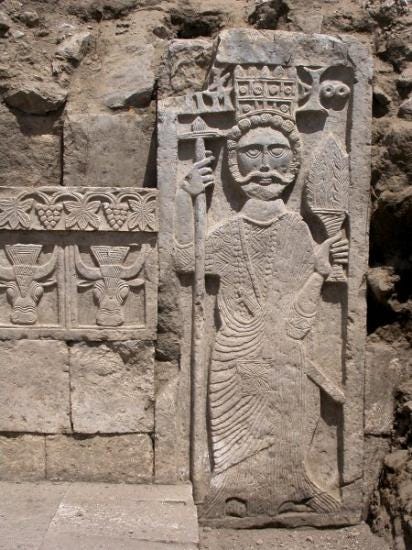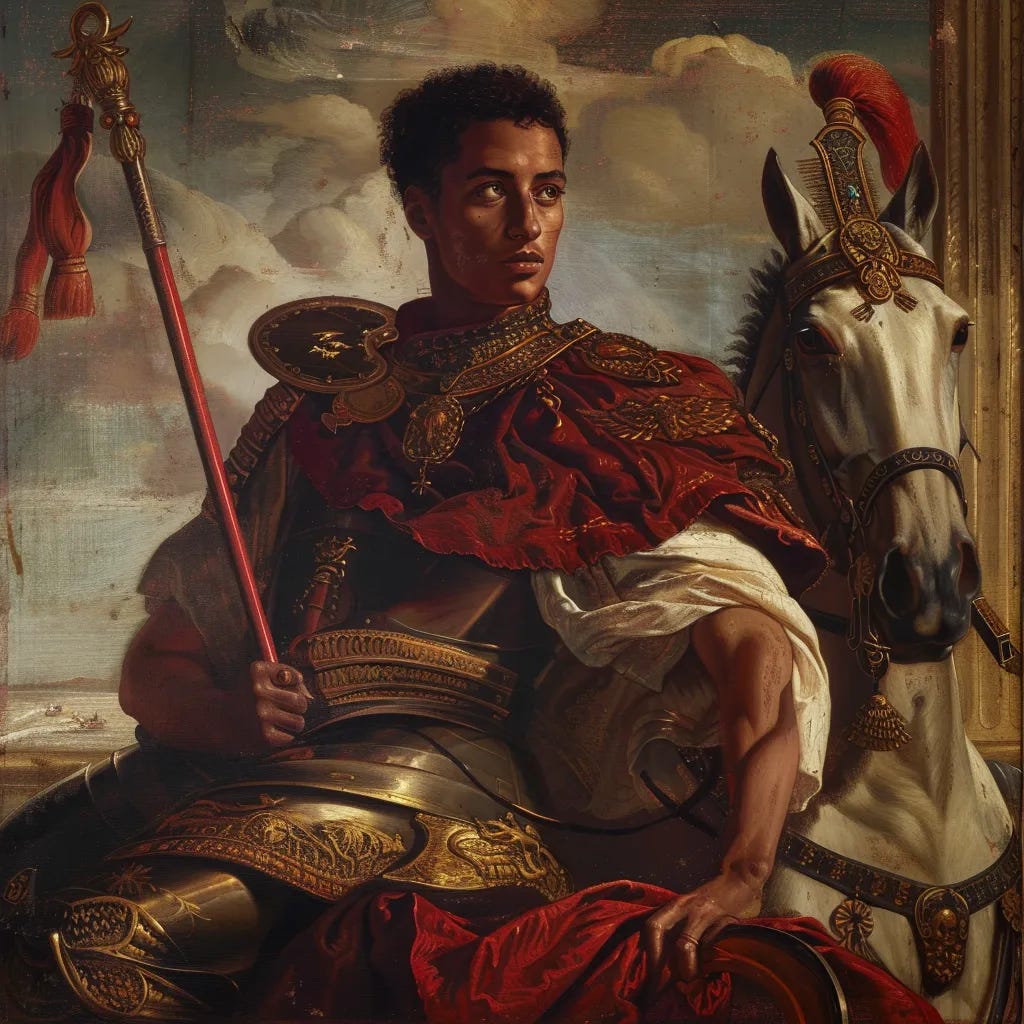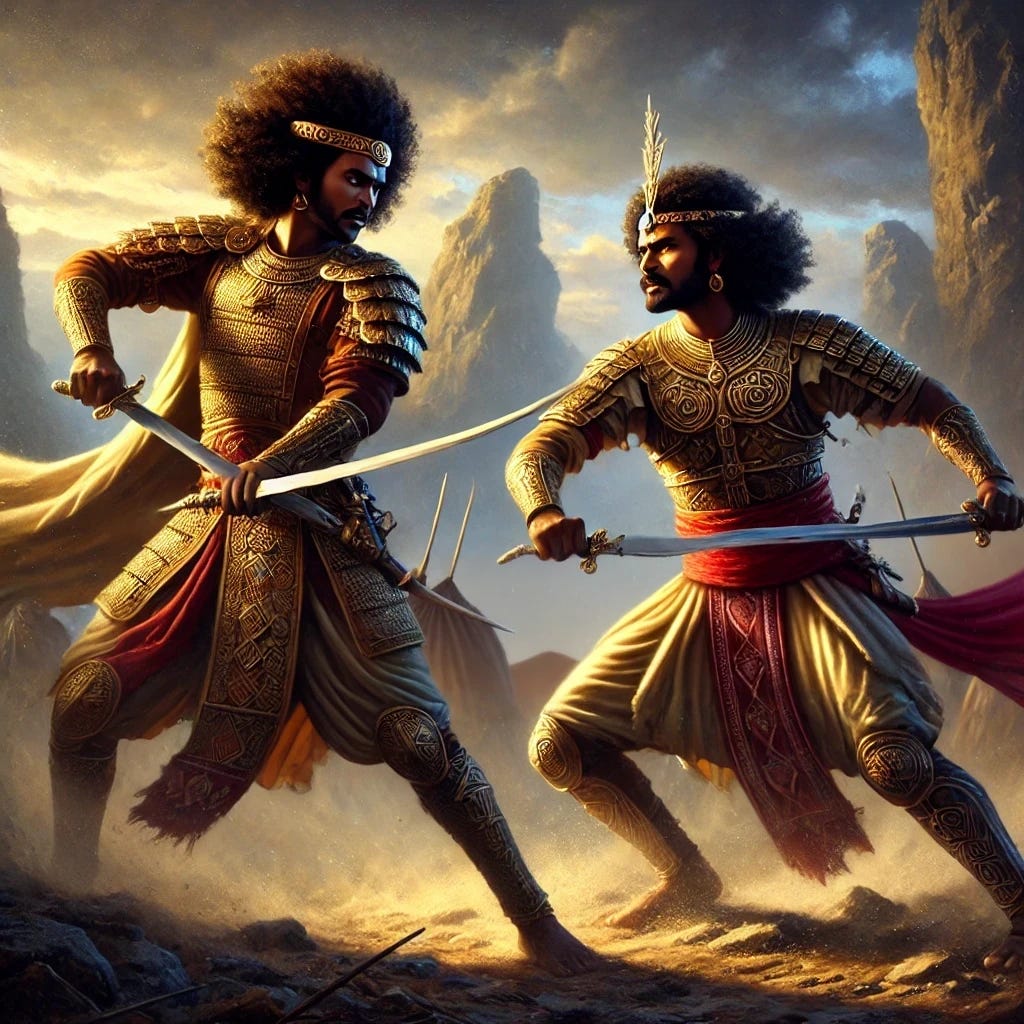Abraha: The Rebellious King From Adulis Who Ruled Arabia
Full Article On The Website: HabeshaHistory.com
Click Here For The Full Article On The Website
Introduction
After securing his victories in South Arabia, Emperor Kaleb took significant steps to establish his influence in the region. He initiated the construction of churches around the Himyarite capital, Zafar. Before returning to Aksum, Kaleb crowned Sumuyafaʿ Ashwaʿ, a member of the Himyarite royal family—likely a prince—as the new King of Himyar1. This move not only ensured the legitimacy of Sumuyafaʿ Ashwa’s rule among the local population but also strengthened Kaleb’s control over the region. Sumuyafaʿ Ashwaʿ converted to Christianity and was baptized, further solidifying the Christian presence in Himyar. The following excerpt from the primary source named “Book Of The Himyarites” provides evidence of these events:
"And this Christ-loving King Kālēb took a [man], one of the notables of the Himyarites, who was also of the royal family there, whose name was [WR]. And because he had seen in him goodwill towards faith and that he had greatly desired for a long time to be baptized and to be a Christian, he commanded the [priests who were with him] and they baptized him, and he acted as sponsor at his baptism and made him his spiritual son, and appointed him as king over all the land of the Himyarites. And [Kālēb] gave order on behalf of those who had" - The Book of the Himyarites: Fragments of a Hitherto Unknown Syriac Works , Chapter XLVII section 54b
Ge’ez Inscription Found at Marib, also tells the same account2 (Note: The Inscription was found fragmented, with certain words missing…):
In the name and with the safeguarding of Rahmanan, of his Son Christ the Victor, and of the Holy Spirit, Sumyafa’ Ashwa’, king of Saba’, of Dhu-Raydan, of Hadramawt, of Yamnat, and of their Arabs of the Upper-Country, and of the coast, Ahsan and Sumyafa‘ Ashwa‘, sons of Shurihbi’il, the lords, the Negus of the Aksumites, have built and founded... their armies, a royal one and a princely one, which have completed... Rahmanan and his son... this king with strength and with their army in the company of the king... this king, when their brother went... beside King Ella Asboahah, king of Abyssinia at... Abyssinia from San‘a’, when he waged war on Himyar... kings for Himyar and lieutenants for the Neguses of Aksum... and the tribes of their city Aksum... they submitted to the Aksumite kings and when... and he submitted to them so as to become subjected... for the control of the sea and peace in Himyar... Sharh, Lahay‘at dhu-Hasbah, dhu-Yaz’an, and Hassan and Shurihb’il dhu-Ma‘afiran... Sharah’il, Nawf, and Baril... subjected to him Aswadan, Sumuyafa‘ dhu-‘Abadan... Shurihbi’ll son of Abishamar dhu-Ru‘ayn, ‘Amr, and... dhu-Khalil, Zur‘at dhu-Marhab, Malik, and Ns’... ‘Amr, and his son Marthad’il dhu-... Harith and Marthad dhu-Tha‘laban... Mawhab’ilan dhu-Mawda‘ and their daughters... Ella Asbohah, Negus of the Aksumites, and when they entrusted and preserved... be it He grants rest or He delivers... the son {borne of a slave mother} of their father Shurihbi’il Yakmul and... Shurihbi’il, Ma‘dikarib, and Sumtyafa‘ dhu-... In the name of Rahmanan, of his son Christ the Victor, and of the Holy Spirit... Jun... Malik...<br> - Arabs And Empires Before Islam. page, 169
Abraha’s Origins

In addition to appointing Sumuyafaʿ Ashwaʿ as King of Himyar, Emperor Kaleb also entrusted General Abraha with a crucial role in the aftermath of the South Arabian campaign. Abraha, who hailed from humble beginnings in the port city of Adulis3, had risen through the ranks of the Aksumite Army due to his tactical brilliance and battlefield cunning. As noted by historian Sergew Hable Selassie, Abraha was neither physically imposing nor strong—described as short and stout, suggesting that his successes in battle were the result of his strategic acumen rather than personal combat prowess.
Although Abraha was not a general of the conventional Aksumite army during Emperor Kaleb’s invasion of Himyar—those positions were held by commanders like Hayyan and Ariat—he was entrusted with the leadership of a large contingent of slaves. With this unconventional force, Abraha played a pivotal role in the Aksumite victory in Himyar. His success earned him the position of commander over all Aksumite forces remaining in Himyar(around 5000), responsible for maintaining stability and ensuring the region’s tributary status to Aksum after Emperor Kaleb’s return.
He was crowned commander over all Aksumite forces by Emperor Kaleb at the capital of Himyar Zafar4.
“In this Aethiopian army many slaves and all who were readily disposed to crime were quite unwilling to follow the king back, but were left behind and remained there because of their desire for the land of the Homeritae ; for it is an extremely goodly land.These fellows at a time not long after this, in company with certain others, rose against the king Esimiphaeus and put him in confinement in one of the fortresses there, and established another king over the Homeritae, Abramus by name. Now this Abramus was a Christian, but a slave of a Roman citizen who was engaged in the business of shipping in the city of Adulis in Aethiopia.”- Procopius, History Of The Wars, with an English translation by H.B. Dewing. PG 191
The Greek Historian, Procopius mentions him as being a slave to a merchant operating in adulis, whether this is true is questionable as Procopius never visited Aksum directly and rather this information was told by third parties therefore it’s possible this information was tainted, in addition to this it wasn’t Aksumite tradition for generals to be from slave class5. however, there has to be some truth to it therefore it’s most likely at the very least he might have been from a poor background, that had once been part of the royal lineage but had since lost its grace. Interestingly the Indigenous Ge’ez version mentions his mother was a slave, maybe his father had married a low born….
Abraha’s Rebellion
Multiple sources attest to Abraha’s rebellion, including the Greek historian Procopius, as well as various Arabian accounts. However, the most detailed descriptions are provided by Arabian sources. Fortunately, Historian Sergew Hable Selassie translated and mentioned these sources in his book Ancient and Medieval Ethiopian History to 1270, specifically on pages 145-146. The following accounts are from the above-mentioned pages…
Around 535AD, General Abraha with the support of the Aksumites forces stationed in Himyar, seized the royal court at Zafar and imprisoned Sumuyafaʿ Ashwa, Abraha now proclaimed himself King of Himyar. These events quickly spread around the realm, and it’s to no surprise that when Emperor Kaleb heard of this betrayal he was angered, therefore he sent over 3000 soldiers to pacify this rebellion and sent his royal prince Ariat to lead the army and take back power, Ariat6 was described as tall, striking general with battle-hardened experience, however soon after these forces arrived and had camped readying for battle, Emperor Abreha employed his messengers to be sent to the Camp with the following message:
“We have the same fatherland and the same religion. Both of us are serving the same purpose which is to fight for our father-land and religion. We should not shed the blood of our soldiers; if you like let the two of us alone fight a duel” - Ancient And Medieval Ethiopian History, pg 146
The Duel
Prince Ariat likely viewed the impending confrontation with Abraha as a solemn and fateful moment. He understood that if a battle were to commence, it would pit two Aksumite forces against each other—composed of fellow Habesha brothers. There was no need for such bloodshed. Ariat believed that a duel between the two ambitious princes could resolve the matter of succession without unnecessary loss of life of their troops & civilians caught in the crossfire. Confident in his physical superiority, Ariat, who was taller and stronger than Abraha, felt assured of victory.
However, Abraha, who had risen from humble beginnings in Adulis and had a keen understanding of the darker sides of society, had other plans. Having climbed the Aksumite hierarchy through cunning and surrounded himself with a loyal force primarily made up of slaves and criminals, Abraha was no stranger to using trickery to achieve his goals. He devised a plan to secure his victory in the duel by deceit.
Abraha’s loyal servant, Arangada, hid in a trench near the secluded area where the duel was to take place, armed with spears. As the duel unfolded and it seemed that Abraha was losing, Arangada acted on his orders. He threw a spear aimed at Ariat’s head, but it deflected off Ariat’s helmet, grazing Abraha’s face instead. Undeterred, Arangada threw a second spear, this time striking Ariat mortally and killing him.
For his treacherous assistance, Arangada was promised any reward he desired. He made a degenerate request: to have premarital relations with any woman of his choosing, disregarding the women’s consent. This vile demand outraged the local populace, and Arangada was soon killed as a result.
Following Ariat’s death, his remaining forces, fearing retaliation from Emperor Kaleb for the dishonourable outcome of the duel, chose to remain in Himyar. When Emperor Kaleb learned of the slaying of Prince and General Ariat, he was enraged and demanded retribution. Knowing that his treachery would not go unpunished by Kaleb and fearing a stronger invasion, Abraha quickly sent messengers to Kaleb, offering his submission. The following is the message:
"Oh! King Ariat, your slave came against me, your power here to weaken and your army to kill. To avoid that, I proposed him a duel in which I killed him. Now the whole kingdom is yours. I ask submission to you. But because you swore that you would shed my blood and trample under your feet my land, I sent a bag full of earth mixed with my blood. You can fulfill your oath by trampling on it. I am your slave, my well-being is yours too”. - Ancient And Medieval Ethiopian History, pg 146
Abraha The King
….






I was very interested by this article but I stoped the reading because a mistake or a desire to lie appeared from the beginning! I am habeshawi and I did my research! Abraha was Oromo! I would have also liked him to be Habesha but that is not the case!